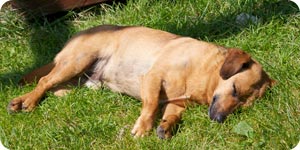
If your dog has signs of intestinal illness, such as vomiting and diarrhea, he could have Canine Coccidia. Canine Coccidia are microscopic parasites, which invade the intestines and cause water diarrhea, severe vomiting, dehydration, weight loss, abdominal pain and lack of appetite. While this parasitic infection is not generally a threat to healthy dogs, it can be deadly to puppies and older dogs if not treated quickly and properly. So it is very important that a dog exhibiting these symptoms be taken to his veterinarian. The veterinarian will use a fecal flotation examination to determine if the dog has Canine Coccidia and treatment will begin.
After the veterinarian has diagnosed your dog with Canine Coccidia, the steps for treatment are:
- Isolate the infected dog from any other dogs to keep from spreading the illness.
- Treat the animal with medication. These medications are usually a sulfadimethoxine such as Albon, Bactrovet or Tribrissen.
- Continue the medication treatment for 10-14 days or until the infected dog has not shown any symptoms for at least 48 hours.
- Dehydrated dogs may be put on intravenous fluids (IV) which will generally require a stay at the veterinarian’s clinic until the veterinarian believes it to be safe to remove the IV.
- Remaining dogs that may have been exposed to the ill dog should also be treated with the same medication as a precautionary measure.
- Thoroughly clean any area where the infected dog may have been. A solution of eight ounces of bleach mixed with one gallon of water should be sprayed on the area and allowed to sit 20 minutes. Rinse the bleach solution thoroughly with water and allow to completely dry before returning any dogs to the area.
- Grassy areas exposed to the infected dog should be isolated for at least a month before allowing any dogs to return to them.
- Bathe all dogs, infected or not, to remove any fecal matter that may be on them. Rinse well with quaternary ammonium disinfectant, being careful not to get it in their eyes. Rinse thoroughly with water.
Canine Coccidia is preventable, and proper cleanliness is the preventative. This cleanliness must include the proper removal and disposal of all fecal matter. While fecal matter appears to be the biggest problem, rodents can also carry this parasite. Because of this, never allow a dog to eat a rodent. If preventative measures are followed, this is an illness that owners of healthy dogs should never encounter.
